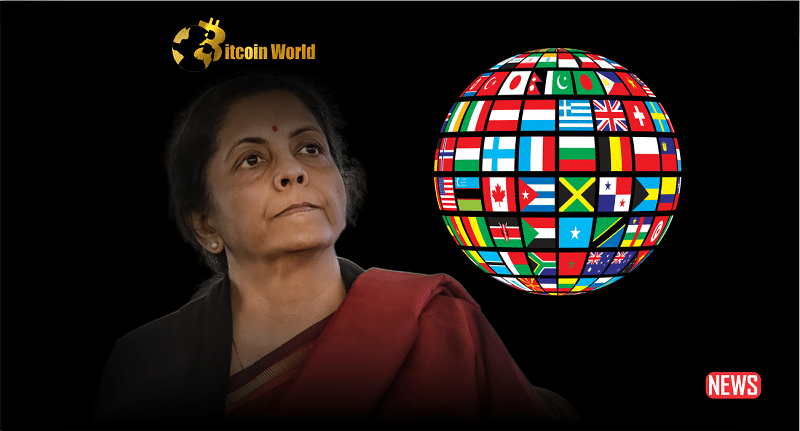Ever felt like the world of cryptocurrency is a bit like the Wild West? Uncharted territory with exciting possibilities but also its fair share of risks? You’re not alone. India, currently holding the G20 presidency, is stepping up to the plate, advocating for a unified global approach to regulating this fascinating and sometimes perplexing world of digital assets. Let’s dive into why this matters and what it could mean for the future of crypto.
Why is Global Consensus on Crypto Regulation So Important?
Imagine trying to play a sport where everyone has different rules. Chaos, right? That’s kind of what it’s like with cryptocurrency right now. Indian Finance Minister Nirmala Sitharaman recently highlighted a crucial point during engagements in Bengaluru: we need everyone on the same page when it comes to regulating crypto. Why? Because:
- Borderless by Nature: Cryptocurrencies don’t respect national boundaries. A transaction can zip across the globe in seconds. This means that a regulation in one country can easily be circumvented if other countries don’t have similar rules.
- Preventing Regulatory Arbitrage: Without a global agreement, crypto businesses might flock to jurisdictions with the least stringent rules, potentially creating loopholes and instability.
- Protecting Investors: A unified framework can help safeguard individuals from scams and market manipulation, fostering greater trust and confidence in the digital asset space.
India’s G20 Presidency: Putting Crypto on the Global Agenda
India isn’t just talking about this; they’re actively making it a priority. As the current G20 president, India has put digital asset regulation squarely on the agenda. Think of the G20 as a gathering of the world’s major economies – a powerful platform to drive global change. By bringing this topic to the forefront, India is pushing for international cooperation to build a solid foundation for cryptocurrency regulation. This includes:
- Facilitating Discussions: India is hosting meetings and encouraging dialogue among G20 nations to explore different regulatory approaches.
- Leveraging Expert Insights: Organizations like the International Monetary Fund (IMF) are contributing valuable research, such as their paper on the potential impact of private digital assets on macroeconomic stability.
- Anticipating Reports: The Financial Stability Board (FSB), established by the G20, is preparing a report on financial stability related to cryptocurrencies, which will be a crucial input for future discussions.
The Tech Factor: Why a Unified Approach Makes Sense
Sitharaman rightly pointed out that you can’t regulate something that inherently transcends borders with just one country’s laws. Crypto assets are technology-driven, and technology doesn’t recognize geographical limitations. Imagine trying to contain water with a fence – it will simply flow around it. This highlights the need for a collective effort. As she emphasized, this isn’t about controlling the underlying technology (distributed ledger technology), but rather about establishing rules for the assets built upon it.
What’s Next? India’s September Summit and Beyond
Keep an eye on September! India is set to host a significant summit bringing together G20 Presidents and Prime Ministers to specifically discuss digital asset legislation. This is a golden opportunity for India to take a leading role in shaping the future of crypto regulation. It’s a chance to address the challenges head-on and work towards a framework that balances innovation with risk management.
The Contrasting View: RBI’s Call for a Ban
While India is pushing for global consensus, it’s important to note that there are differing opinions within the country. The Reserve Bank of India (RBI), the central bank, has historically held a more cautious stance. RBI Governor Shaktikanta Das has even advocated for a complete ban on private cryptocurrencies, citing concerns about potential financial instability. This highlights the ongoing debate and the complexities involved in finding the right approach.
Key Takeaways: Navigating the Future of Digital Assets
So, what does all this mean for you and the world of crypto? Here are some key takeaways:
- Global Collaboration is Crucial: Effective cryptocurrency regulation requires countries to work together.
- India is Taking the Lead: Through its G20 presidency, India is actively driving the conversation on international crypto policy.
- Technology Presents Unique Challenges: The borderless nature of crypto necessitates a unified global response.
- Balancing Innovation and Risk: The goal is to create a framework that allows the benefits of digital assets to flourish while mitigating potential risks.
- The Debate Continues: Different perspectives, like the RBI’s stance, highlight the ongoing discussion and the need for careful consideration.
Looking Ahead: A Harmonized Crypto Landscape?
India’s push for global consensus on cryptocurrency regulation is a significant step towards creating a more stable and predictable environment for digital assets. While challenges remain and differing opinions exist, the momentum towards international cooperation is building. The upcoming G20 summit in September will be a crucial moment to see how this vision takes shape. The journey towards a harmonized global crypto landscape is underway, and India is playing a pivotal role in steering the course.
Disclaimer: The information provided is not trading advice, Bitcoinworld.co.in holds no liability for any investments made based on the information provided on this page. We strongly recommend independent research and/or consultation with a qualified professional before making any investment decisions.




